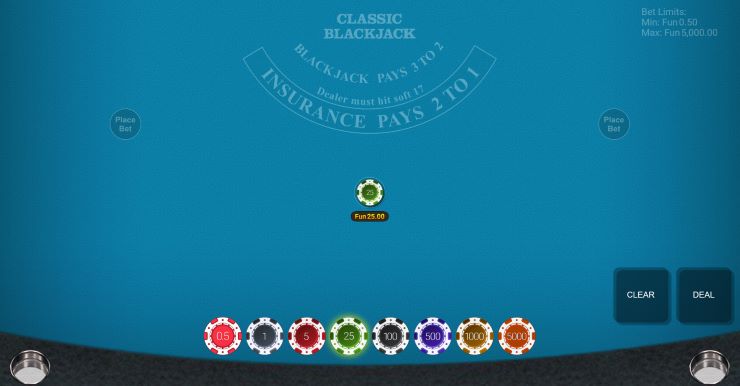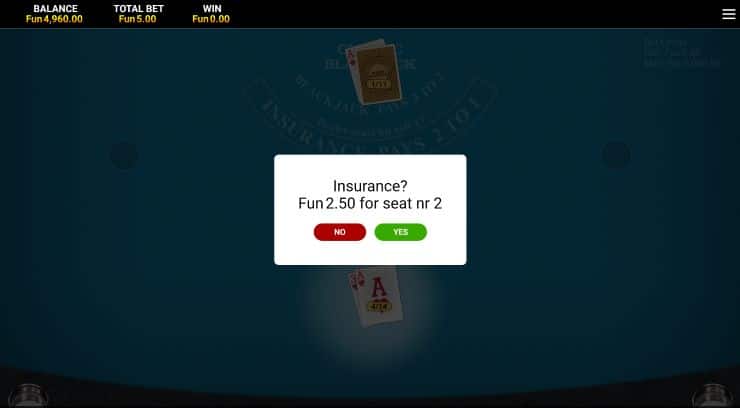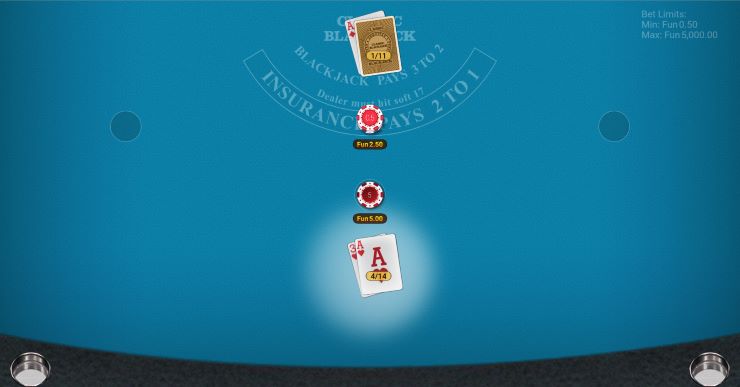David spent 25 years as both a writer and editor within the betting/casino industries - including at The Guardian, Racing Post, 888Casino and Sky Sports Racing - prior to joining BBI. He has a diploma in sub-editing and law, is the author of four books, and remains a successful sports tipster.
All posts by David MyersWriter and editor with over 15 years of experience in the iGaming industry, having worked for TeamTalk, ClubCall, Planet Sport and several Tier 1 and Tier 2 sportsbooks. Passionate Middlesbrough FC supporter.
All posts by Andrew MorganBlackjack insurance is a unique side bet that covers you if the dealer’s up card is an Ace and their hole card has a value of 10. However, insurance bets can be tricky, especially regarding how they work, when to place them, and understanding the benefits and drawbacks of the wager.
- Show full guideShow less
What Does Insurance Mean in Blackjack?
Blackjack insurance is a separate bet you can place when playing blackjack if the dealer’s up card is an Ace. This bet protects you if the dealer’s hole card is a 10. This would mean they would have natural blackjack and thus win. You can place insurance bets in both online games and at a blackjack table at a brick-and-mortar casino.
Here is the basic insurance blackjack strategy. You may put down a maximum of half your original stake when placing this separate insurance bet. If the dealer has natural blackjack, your blackjack insurance odds are 2:1, allowing you to break even on that round.
However, you lose your insurance bet if the dealer does not have blackjack. While this may seem like an appealing bet to place, many bettors advise against it. This is because the odds of the dealer having blackjack are less than 50%. As such, the bet will most likely end in a loss. This means you will lose money that you could have spent on a more lucrative bet.
Nevertheless, it is an excellent way to provide coverage if you’re a new bettor learning the game. Furthermore, if the dealer doesn’t get blackjack, the game continues and you still have a chance of winning the round.
How Does Blackjack Insurance Work?
Another pivotal question that needs answering is how does insurance work in blackjack? Insurance in blackjack becomes an optional side bet in two instances: when the dealer’s upcard is an Ace or if you have a hand with a value of 16 or less.
If you find yourself in one of these situations, consider placing an insurance bet. You can wager half your original stake where the blackjack odds pay at 2:1.
For example, if you have a hand with a Jack and a five and the dealer has an upcard of an Ace, you may decide to take out an insurance bet. This would be at half your original stake so if the dealer’s hole card has a value of 10 and they land blackjack, you win your insurance bet and break even.

What Are The Odds On a Blackjack Insurance Bet?
The odds of winning your black jack insurance bet rest on the probability or likelihood of the dealer having blackjack. The chances of the dealer landing blackjack with their upcard as an Ace is 30.8% when playing with a single deck of cards.
In other words, you will win your insurance bet only 30.8% of the time and thus stand a greater chance of losing. Of course, this doesn’t mean you’ll lose the hand. If the dealer draws a low-value card, you could still win as the game continues as normal.
However, we rarely recommend taking blackjack insurances. Additionally, the house edge is higher than average, at 8.75%. This, combined with a high probability of losing, means that insurance bets are generally not worth it.
When Should You Take Insurance in Blackjack?
Besides knowing the blackjack insurance rules, it also pays to know when to place an insurance bet on blackjack. Understanding the best time to place an insurance bet will help you make a more informed decision. So, when should you buy insurance on blackjack?
When the Dealer Shows an Ace
If the dealer lands an Ace as their upcard, you may want to consider buying black jack insurance as they have a higher chance of making blackjack. By taking insurance, you set yourself up to break even if the dealer does have blackjack. If the dealer doesn’t land blackjack, you lose your insurance bet, but the game continues as normal. This means you still have a chance of winning the hand.
When You Have a Low Hand
You may want to consider insurance bets if you have a low-value hand of 16 or less. This is because if you pull another card, you have a high chance of going bust (when your hand value exceeds 21) and losing. By taking insurance, you can minimize your losses. Of course, there is also a chance you could pull another low-value card and win.

Advantages and Disadvantages of Insurance Bets in Blackjack
When playing blackjack, the aim is to beat the dealer’s hand by getting yours closer to 21. A hand that ends in a tie results in a push. In this case, you receive your original stake back.
Taking insurance in blackjack is advantageous when you’re playing a game that uses many decks. The more decks involved in the game, the more cards there are in the shoe with a value of 10. This boosts the dealer’s chances of landing blackjack.
Insurance can also be advantageous for new players learning the ropes and wanting to extend their playing time, particularly when playing at the best live blackjack casinos.
Conversely, insurance in blackjack can be disadvantageous if you have a hand valued at around 14 or 15, as things could swing either way. You could pull a six or a seven and make blackjack, or you could land a higher-value card and bust. Your chances of either are relatively equal here, making insurance unnecessary.
Most avid blackjack players view insurance bets as a disadvantage as the chance of losing is higher than winning. The low odds of 2:1 also don’t make the wager worth much and will only serve to help you break even if you win. The key is in the word insurance – it protects you against a dealer’s blackjack rather than boosting any winnings. It therefore should be seen as an insurance line above anything else.
Insurance Blackjack Examples
Now that we have covered questions like what is an insurance bet in blackjack and what does insurance mean in blackjack, we can look at a few examples of how insurance blackjack works.
An example of winning your black jack insurance bet may look like this:
- You stake $20.
- You’re dealt a Jack and an 8.
- The dealer’s upcard is an Ace.
- You place a blackjack insurance bet of $10 (half your original stake). This means you have wagered $30 in total ($20 on your original stake and $10 on the insurance).
- The dealer reveals their hole card, which is a 10. They have a natural blackjack.
- You win your insurance bet at odds of 2:1, breaking even by winning back $30 ($20 insurance bet winnings + $10 insurance stake).

An example of losing your black jack insurance bet may look like this:
- You place a bet of $20.
- You receive a Jack and an 8.
- The dealer’s upcard is an Ace.
- You stake a blackjack insurance bet of $10.
- The dealer reveals their hole card, which is a 5. They don’t have blackjack.
- You lose your insurance bet but continue to play, seeing if the dealer can beat your hand of 18. There is still a chance you can win the round.
Conclusion
We have determined that taking insurance in blackjack can be advantageous in some instances. However, it isn’t a wager that most pro players would recommend. It is certainly worth checking out the blackjack insurance rules as stated in this article before proceeding.
While you have the chance of breaking even should the dealer land blackjack with an Ace upcard and a 10 hole card, the probability of the dealer landing blackjack is only 30.8%. The odds are similarly unattractive if you have a low hand. As a result, the odds of losing your insurance bet are higher than winning it. Therefore, in the long run, it’s not a wise bet to make.
FAQs
What is blackjack insurance?
Blackjack insurance is a side bet that pays at odds of 2:1. The aim is to cover you against natural blackjack should the dealer’s upcard be an Ace.
When should I take insurance in the blackjack game?
The best time to take insurance is when you have a low hand that could see you bust if you take another card. The other option is if the dealer has an Ace as their upcard and you believe their hole card could have a value of 10.
Is taking insurance in blackjack beneficial?
If you are playing blackjack with many decks, where the shoe holds more cards with a value of 10, then taking insurance when the dealer lands an Ace upcard can be beneficial as their chances of making blackjack are higher. However, generally, most blackjack pros advise against taking the insurance bet.
What are the odds on blackjack insurance?
The chance of the dealer making blackjack with an Ace upcard is 30.8%. Therefore, the chance of winning your blackjack insurance bet in this circumstance is 30.8% too. However, with the 8.5% house edge, the chance of losing the bet is higher. Similar probabilities operate if you have a low hand.
Is insurance available in all versions of blackjack?
No. As blackjack insurance is a unique side bet, some online casinos may consider this a bonus bet and not offer it on some game variations.

David spent 25 years as both a writer and editor within the betting/casino industries - including at The Guardian, Racing Post, 888Casino and Sky Sports Racing - prior to joining BBI. He has a diploma in sub-editing and law, is the author of four books, and remains a successful sports tipster.
All posts by David MyersDavid spent 25 years as both a writer and editor within the betting/casino industries - including at The Guardian, Racing Post, 888Casino and Sky Sports Racing - prior to joining BBI. He has a diploma in sub-editing and law, is the author of four books, and remains a successful sports tipster.
All posts by David Myers